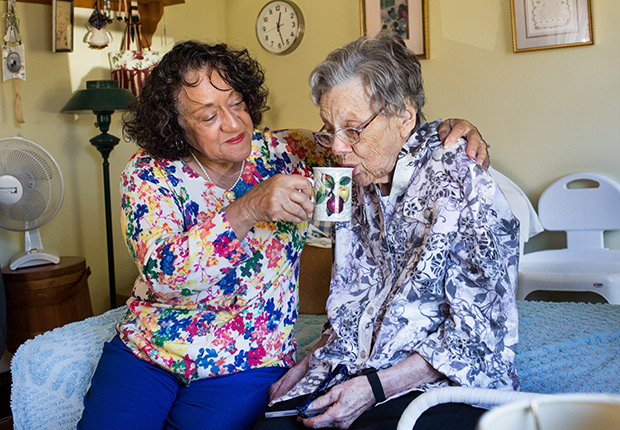AARP Hearing Center

By Nell Lake
Every morning, Carolyn Lassiter brings breakfast to the bed of her 95-year-old mother, Etta Mae Tilford. “She loves that first morning cup of coffee,” Lassiter said, “and she wants it from me.”
Tilford has congestive heart failure, cognitive difficulties and other conditions such as a high risk for falls, making it impossible for her to live alone. Four years ago, Lassiter brought Tilford home to live with her.
Lassiter, a real estate agent who lives in Melrose, cooks meals for her mother, shops for her groceries and manages Tilford’s many medications: two pills in the morning, three at night and eyedrops for glaucoma.
Caregiving is “exhausting and challenging” work, Lassiter said. Even though Tilford receives daily help from home health aides, Lassiter, 73, worries about her mother while at her job, and she hurries home every day to make sure Tilford is OK.
“It’s not easy,” Lassiter said. Still, she cherishes caring for her mother. “It’s a gift. Every single night I tuck her in and she says, ‘I love you.’ What a feeling that is.”
Roughly 844,000 Massachusetts residents provide unpaid care for adult family members and friends by helping with daily activities such as bathing, cooking and shopping, according to a recent report by the AARP Public Policy Institute (PPI).
And an AARP Massachusetts survey of voters age 45 and older found that nearly three-quarters were either caring for or had cared for family members or friends.
Like Lassiter, two-thirds of those have shouldered complex duties, such as nursing tasks and medication management.
Family caregivers’ labor in the state is worth $11.6 billion annually, according to the PPI Valuing the Invaluable report. “If it weren’t for those good people providing the care they do, society would be in serious trouble,” said Michael Festa, AARP Massachusetts state director. “We couldn’t afford the delivery of those services.”
Festa noted that caregivers often enable their loved ones to stay at home rather than go into expensive institutions, an arrangement most caregivers and their care recipients prefer, and which saves society money. “We need to find ways to better support family caregivers, including the passage of state laws,” he said.
Sources of support
The AARP Massachusetts survey found that 61 percent of caregivers have felt stress around caregiving demands. Lassiter is among them. But she’s grateful for her local eldercare agency, Mystic Valley Elder Services, which she said has been an essential source of support: “I could not do this without them.”
The agency is one of 27 state Aging Services Access Points (ASAPs), which help caregivers navigate the often complex world of eldercare. ASAPs help with assessing a care recipient’s needs, figuring out which public programs a person is eligible for, finding home health aides, connecting caregivers with respite services and support groups, and connecting recipients with senior day care and other programs.
Studies have found that family caregivers face greater emotional and physical stress than noncaregivers. It’s important, experts say, for caregivers to take care of themselves.
Lassiter agrees. She has her own chronic health condition—asthma. But after her mother moved in, Lassiter stopped going to her allergist for management of her symptoms. “The visits were just one more thing I had to squeeze in,” she said.
Soon Lassiter found her cough worsening. When she did see her allergist, the doctor said, “If you don’t take care of you, Carolyn, you can’t take care of anybody else.”
Here are some ways for caregivers to find help:
- Identify your ASAP by calling 800-AGE-INFO (800-243-4636; TTY: 800-872-0166) or going to 800ageinfo.com/learncenter.
- Visit AARP’s Caregiving Resource Center at aarp.org/caregiving or call 877-333-5885 toll-free. Go to the I Heart Caregivers initiative at aarp.org/iheartcaregivers for resources and to connect with other caregivers.
Nell Lake, a journalist, is the author of The Caregivers: A Support Group’s Stories of Slow Loss, Courage, and Love.































































